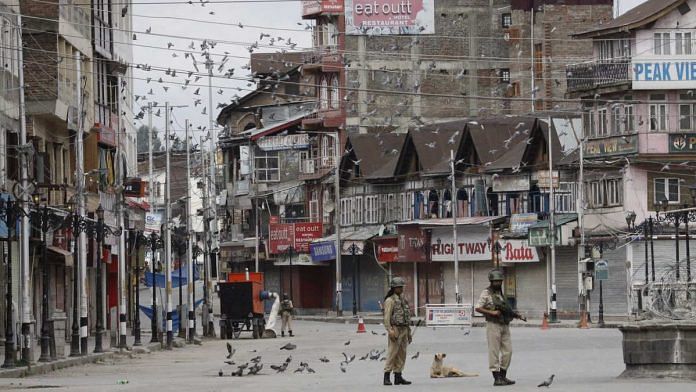New Delhi: Senior advocate Kapil Sibal Thursday called the procedure adopted to abrogate Article 370 a “mosaic of illegalities”, saying it was “attractive enough to be junked”.
Continuing with his attack on the move to suspend the constitutional provision that gave special status to the erstwhile state of Jammu and Kashmir, Sibal said it seems to be the work of “some great constitutional adviser who would have thought of this complicated handiwork, which found itself in our Constitution”.
Sibal made his submissions on behalf of National Conference leader Mohammad Akbar Lone before a five-judge Constitution Bench of the Supreme Court, which Wednesday commenced hearing a batch of petitions against the presidential orders that made Article 370 inoperative in August 2019 and subsequently bifurcated the state into two Union territories (UTs).
While Ladakh was carved out as a UT, J&K was designated a UT with a legislative assembly.
Sibal maintained that the state’s bifurcation could not have happened without its consent. Unlike other states where only a view needs to be sought, in the case of J&K, its consent is required, according to the Constitution, he told the bench.
On the second day of the hearing, the senior counsel reiterated his argument that Article 370 was a permanent provision and not a temporary one, as claimed by the Centre.
This argument left the judges intrigued. They asked Sibal whether his argument on Article 370 would not amount to “creating a new category, apart from the basic structure, that would be incapable of being amended”.
Te judges were referring to the fact that the Constitution’s basic structure is protected from amendment by Parliament.
Sibal will resume his arguments next Tuesday.
Also Read: Article 370 hearing, Day 1: J&K Constituent Assembly’s nod needed for abrogation, Sibal tells SC
Constitution & questions
On Thursday, Sibal advanced a two-fold argument before the bench led by Chief Justice of India D.Y. Chandrachud.
He first addressed the court on Article 370 being a permanent provision and then argued on the alleged procedural lapses behind its abrogation.
Sibal’s suggestion on permanence of Article 370 — where he said that after the constituent assembly for the erstwhile state of Jammu and Kashmir ceased to exist in 1957, there was no constitutional process left to touch Article 370 and changes, if any, could only have been made through a political process — was met with many questions from the bench.
The CJI asked him: “How would you then put into place the constitutional machinery (for amendment) because there has to be one. It can’t be that because there is no constituent assembly, you cannot at all deliberate on a proposal for abrogation or modification of Article 370…
“Say in 2019, the President wishes to amend 370…What, according to you, would have been the right constitutional process to do it?”
In Sibal’s view, there was “no constitutional process because the constitution of J&K said in Article 147 that no such bill can even be introduced in the legislature”.
That’s why, he added, he had argued that Article 370 is permanent.
This prompted Justice Kaul to say: “According to you, neither the state legislature can do it, nor the Parliament. What you are saying is that while other provisions of the Constitution may be capable of amendment… other than ones against basic structure, this is one provision which can never be amended.”
On the procedural part, Sibal argued, the President’s Rule imposed in the state before the abrogation suspended the provision that mandated the state’s consent before any Bill could be introduced on J&K.
“So, you lose the link between Centre and state, absorb the power of the state (through presidential rule) as well as the executive, and decide without any reference to any other institution (constituent assembly),” Sibal argued.
Through the presidential rule, he said, governor meant president, and state legislature meant Parliament.
“So, you do what you like, give consent yourself, don’t seek consent and the people who gave themselves the Constitution are left out of the process altogether,” he added.
Sibal called it a “breakdown of the structure engrafted in the Constitution”.
“It’s a complete breakdown, by inhering in yourself as Union the executive power of the state, and in the Parliament the legislative power of the state,” he said.
(Edited by Sunanda Ranjan)
Also Read: Abrogation of Article 370 ‘death of democracy as it was done without consent of state’: Digvijaya



